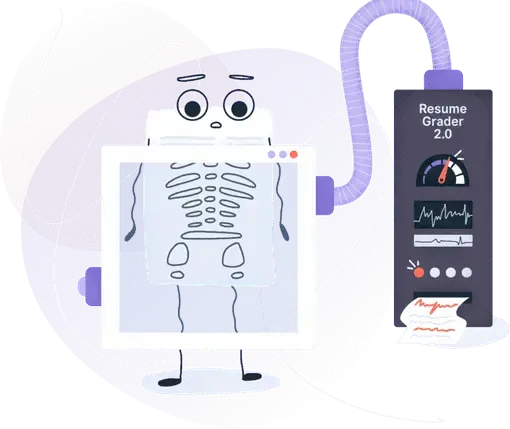Automotive Skills: Example Usage on Resumes, Skill Set & Top Keywords in 2025
Displaying automotive skills on your resume signals to recruiters your adeptness at problem-solving and attention to detail. Dive into the guide below for inspiration on crafting a resume that showcases your talents effectively.


Is your resume ATS-friendly?
Drop your resume here or upload a file to find out if the skills in your resume are readable by an ATS.
Automotive skills refer to the knowledge and abilities related to vehicles, such as repair and maintenance techniques, understanding of automotive technology, and the ability to work with various tools and diagnostic equipment. Having automotive skills on your resume can showcase your technical capabilities and hands-on experience in car mechanics or the automotive industry. These skills demonstrate to potential employers your ability to perform specialized tasks and solve problems related to vehicles, which can be a valuable asset in many job roles that deal with transportation, logistics, or auto manufacturing and repair.
While having automotive skills on your resume can be beneficial, there are some drawbacks to consider. These skills may not be relevant to all job positions, and including them could make your resume seem less focused if you're applying for roles outside the automotive field. Employers looking for more general or unrelated skills might overlook your application. Instead, it's beneficial to tailor your resume to each job you're applying for, highlighting the most relevant skills for that specific role. If automotive skills are essential to the job, ensuring they are prominently featured can help you stand out. However, if they're not directly related, it may be better to focus on other transferable skills that apply more broadly to the position you're targeting.
In this article, you will learn:
- Why preciseness in listing your skills is key to a focused resume.
- The importance of aligning your skills with the job you're aiming for.
- How to present your automotive abilities effectively in your resume.
Misusage of automotive on resumes
Asserting proficiency in automotive skills is crucial in catching a hiring manager's attention, but embellishing or misrepresenting your abilities can backfire. Reality always shows during practical application, so your resume needs to accurately reflect your skillset. Here are three specific examples of how automotive skills can be misused in a resume:
Summary Section Misuse: Claiming to be an expert in complete engine rebuilds when your experience only includes basic oil changes and tire rotations. Actual Summary Example: "Expert in comprehensive engine reconstruction and complex troubleshooting across various vehicle models." Experience Section Misuse: Listing extensive experience with high-performance vehicle tuning when you've only worked with standard family vehicles. Actual Experience Example: "In charge of optimizing high-performance sports cars for maximum efficiency and speed, resulting in a 20% reduction in lap times." Achievements Section Misuse: Citing an award for exceptional customer service in an automotive setting when the award was unrelated to the automotive industry. Actual Achievements Example: "Recipient of the 'Outstanding Customer Support' award for unparalleled service in automotive care and maintenance." Using technical automotive terms is essential, but they must accurately describe your actual skills and experiences. This accuracy ensures credibility and can prevent uncomfortable situations during interviews or on the job.
How to demonstrate automotive skills on your resume
- Highlight your technical expertise by listing specific mechanical skills, such as engine repair or diagnostic abilities, to show your proficiency in vehicle maintenance and repair.
- Detail your professional experience by mentioning the names of previous employers or workshops, giving a brief description of your primary duties and any significant accomplishments or recognition you received.
- Include certifications and education, like ASE certification or any technical or vocational training you've completed, to establish your qualifications and commitment to professional development.
- Point out any specialty competencies, like expertise with hybrid vehicles or proficiency with certain diagnostic software, to demonstrate your adaptability and readiness for modern automotive challenges.
- Quantify your success by presenting clear examples, such as the number of repairs you've efficiently completed or customer satisfaction ratings, to provide concrete evidence of your capabilities.
Example 1: Demonstrate automotive in the experience section
- •Led a team of 5 in conducting detailed diagnostics and maintenance for over 300 electric vehicles, improving customer satisfaction by 20%.
- •Implemented new workflow for battery system troubleshooting, reducing repair times by 35% and boosting team efficiency.
- •Spearheaded a customer education initiative on vehicle care, resulting in a 25% reduction in unnecessary service appointments.
- •Managed appointment scheduling and client service for a dealership, serving up to 500 clients monthly while maintaining excellent service quality.
- •Introduced a new inventory management system for automotive parts, leading to a 15% cut in operational costs through improved logistics.
- •Collaborated with sales and technical teams to create comprehensive maintenance packages that increased repeat business by 30%.
- •Participated in the design and launch of an award-winning SUV, which saw a 50% increase in market share within the first year.
- •Optimized vehicle aerodynamics through rigorous testing, achieving a 10% improvement in fuel efficiency across the model range.
- •Collaborated on cross-functional teams to reduce production costs, directly contributing to a savings of $4 million annually.
- Start with recent, relevant positions to show your current expertise in the automotive field.
- Highlight specific projects and their impact, connecting your work directly to business success.
- Use clear numbers to show the scope and results of your work, giving concrete evidence of your abilities.
- Vary the experiences to cover different roles and responsibilities within the industry to demonstrate your versatility.
- Be precise about the outcomes, focusing on how your contributions made a difference to the company.
Example 2: Demonstrate automotive in the summary section
- The summary clearly states the applicant's experience, emphasizing 4 years in the automotive field, which displays dedication.
- It showcases specific expertise, such as in "engine diagnostics," showing that the applicant has the necessary technical skills.
- The mention of "boosting customer satisfaction" and "cutting service times" indicates a strong performance history that will interest an employer.
- Referring to "proactive approach to vehicle care" suggests that the applicant has a forward-thinking mindset beneficial to the role.
- By citing a concrete achievement, "leading to a 15% increase in workshop efficiency," the applicant provides quantifiable evidence of their impact in previous roles.
- The text is direct, avoiding buzzwords and cliches, and maintains focus on the applicant’s capabilities and achievements.
Example 3: Demonstrate automotive in the achievements section
- Each achievement clearly states the action taken and the positive outcome, with numbers to back up the claims.
- No overused buzzwords clutter the message; the focus is on proven results.
- Descriptions are concise and directly tied to impactful work scenarios, making it easy for employers to see the value of the work done.
- The use of simple, straightforward language ensures clear communication, accessible to readers at a variety of levels.
- The structure is professional and well-organized, facilitating quick scanning and comprehension.
What are the relevant certifications for automotive skills on resume
Here are several certifications that could significantly benefit you in the automotive industry:
The top 5 certifications for gaining automotive skills expertise:
Top skills people add together with automotive skill on resume:
Vehicle Maintenance
Engine Repair
Brake Systems
HVAC Systems
Electrical Diagnostics
Transmission Repair
Automotive Electronics
Oil Change
Tire Rotation
Hydraulics
Problem Solving
Attention to Detail
Customer Service
Time Management
Teamwork
Adaptability
Communication
Organizational Skills
Work Ethic
Critical Thinking
Leadership
Most relevant jobs for automotive skills
If you have skills in automotive technology, there are several career paths available where those abilities will be highly valuable. From fixing cars to designing new models, professionals in the automotive field play an essential role in keeping vehicles running safely and efficiently. Here are some of the most sought-after job titles you might consider:
- Automotive technician
- Auto body repair specialist
- Automotive service manager
- Car salesperson
- Automobile designer
- Quality control engineer
- Parts manager
- Vehicular damage assessor
- Motorsport technician
- Automotive electrician
Key takeaways
- Automotive skills can enhance your resume by showing technical expertise and practical knowledge in the car industry.
- Avoid misuse of automotive skills by understanding their proper application and refraining from exaggerating your abilities.
- Showcase your automotive skills on your resume by detailing specific experiences, certifications, and results achieved.
Make one that's truly you.




